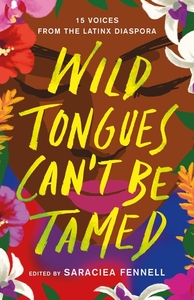Take a photo of a barcode or cover
330 reviews for:
Wild Tongues Can't Be Tamed: 15 Voices from the Latinx Diaspora
Saraciea J. Fennell
330 reviews for:
Wild Tongues Can't Be Tamed: 15 Voices from the Latinx Diaspora
Saraciea J. Fennell
medium-paced
Wonderful collection of stories all sharing the different struggles of being LatinX. I loved how it serves to show that despite the different countries in Latin America the authors stem from, they are all face identity issues that influence all aspects of their lives. Not to mention the book did a really good job at collect a wide range of experiences from Black to LGBTQ+ to 2nd Generation and non-Spanish speakers.q
emotional
informative
inspiring
reflective
medium-paced
emotional
inspiring
reflective
slow-paced
Eres Un Pocho: 5 stars
The Price of Admission: 4 stars
Caution Song: 3 stars
The Mark of a Good Man: 4 stars
#JULIAN4SUPERMAN: 5 stars
Half In, Half Out: 4 stars
Haitian Sensation: 3 stars
The Land, the Ghosts, and Me: 3 stars
Paraiso Negro: 4 stars
Cuban Imposter Syndrome: 4 stars
More than Nervios: 5 stars
Alaiyo: 5 stars
Invisible: 5 stars
Abuela's Greatest Gift: 4 stars
A Mi Orden: A Meditation on Dichos: 5 stars
The Price of Admission: 4 stars
Caution Song: 3 stars
The Mark of a Good Man: 4 stars
#JULIAN4SUPERMAN: 5 stars
Half In, Half Out: 4 stars
Haitian Sensation: 3 stars
The Land, the Ghosts, and Me: 3 stars
Paraiso Negro: 4 stars
Cuban Imposter Syndrome: 4 stars
More than Nervios: 5 stars
Alaiyo: 5 stars
Invisible: 5 stars
Abuela's Greatest Gift: 4 stars
A Mi Orden: A Meditation on Dichos: 5 stars
For purposes of disclosure, I received an ARC of this book.
A collection of diverse memoir essays reflecting on the experiences of Latinx individuals. As with any collection of essays or short stories, the styles and topics varied. While some impacted me more than others, I can truly say I appreciated them all.
A collection of diverse memoir essays reflecting on the experiences of Latinx individuals. As with any collection of essays or short stories, the styles and topics varied. While some impacted me more than others, I can truly say I appreciated them all.
informative
reflective
medium-paced
emotional
funny
medium-paced
I think somewhere just north of 4 stars. I loved this book so much. Each story is rich, descriptive, emotional, and informative in its own way. It centered Afro-Latiné identities and called out the endemic racism and colorism towards dark skin and African heritage in the community. Such intentional and important representation for young readers (I believe the anthology is marketed as YA). It didn't shy away from telling difficult stories and felt completely contextualized in the realities of the past decade. It's an important read for anybody, but I think especially for white and white-passing latinés who need to understand light skin privilege.
The only reason it doesn't hit 5 was the limited space for joy. Each other honored part of their identity and heritage, but the stories focused on the pains and struggles of being Latiné rather than celebrating it. Don't get me wrong, visibility is crucial for change. But there have been many achievements and moments for unity that I felt didn't get any light. Yes, it's difficult to be Latiné in America *especially* if you present non-white. But from the groups of young chicané voters who helped flip elections in 2016/2020 to the unity of boricuas rebuilding their island after Maria and the many invisible achievements Latiné people in making space for themselves, I thought we would get to show off a bit more joy as a community.
Lastly - the term Latinx felt really forced. It was clear that it was an editorial choice to present just one term, which felt counter intuitive to the mission of presenting diversity of experience and identification. One essay touched on the term and I took it that that particular writer wouldn't have used the term Latinx on their own. Latinx is controversial as a term that was popularized by white, academic spaces in an effort to be inclusive but really just ignores linguistic logic for Spanish speaking people. I wish there had been a note about the choice to use this term only.
I will recommend this book over and over again and hope to get a chance to teach it at the high school level.
The only reason it doesn't hit 5 was the limited space for joy. Each other honored part of their identity and heritage, but the stories focused on the pains and struggles of being Latiné rather than celebrating it. Don't get me wrong, visibility is crucial for change. But there have been many achievements and moments for unity that I felt didn't get any light. Yes, it's difficult to be Latiné in America *especially* if you present non-white. But from the groups of young chicané voters who helped flip elections in 2016/2020 to the unity of boricuas rebuilding their island after Maria and the many invisible achievements Latiné people in making space for themselves, I thought we would get to show off a bit more joy as a community.
Lastly - the term Latinx felt really forced. It was clear that it was an editorial choice to present just one term, which felt counter intuitive to the mission of presenting diversity of experience and identification. One essay touched on the term and I took it that that particular writer wouldn't have used the term Latinx on their own. Latinx is controversial as a term that was popularized by white, academic spaces in an effort to be inclusive but really just ignores linguistic logic for Spanish speaking people. I wish there had been a note about the choice to use this term only.
I will recommend this book over and over again and hope to get a chance to teach it at the high school level.




